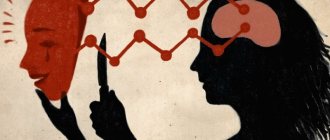general characteristics
Auditory hallucinations are manifested by various sound phenomena - melodies, noises, voices, which are perceived by patients as true, really existing.
The attitude towards hallucinatory phenomena as a pathology is formed gradually as a result of beliefs on the part of loved ones and doctors. In mental disorders, when hallucinatory sounds are justified by delusional concepts, patients continue to believe in the reality of what they hear, despite the assurances of others. Auditory hallucinations can be simple or complex. Simple ones are represented by acoasms - noise, hissing, roaring, grinding, buzzing. Sometimes patients cannot guess what type of source generates the sound, in other cases they clearly determine its “reasons” - the shuffling of a boot sole, the creaking of floorboards, the hum of a car. Another type of simple auditory hallucination is phonemes. These are speech deceptions of hearing in the form of shouts, individual vowel sounds, syllables, and fragments of words.
Complex auditory hallucinations are represented by musical and verbal images. With musical phenomena, people hear playing musical instruments, singing, and melodies. Verbal hallucinations – individual words, phrases, monologue or dialogic speech. Verbal hallucinatory phenomena include commentary, threatening and imperative. Commenting voices express an opinion about the patient’s actions, threatening voices intimidate, imperative voices order or prohibit something to be done, for example, they demand to commit suicide or refuse to eat.
Non-hallucinatory forms of the disease
Almost all types of schizophrenic disorder are accompanied by productive symptoms, namely delusions and hallucinations. They are most clearly presented in the paranoid form, in which they act as leading signs. It is even divided into types depending on the predominance of one of 2 of them: hallucinatory and delusional.
Hebephrenic and catatonic forms are also accompanied by hallucinations. Their severity depends on the phase of the disease and its severity.
But still, there is a type of schizophrenia without delusions and hallucinations. The simple form of the disorder is characterized by gradual development. Periods of exacerbations, delusions and hallucinations are absolutely not typical for her. Its course is dominated by negative symptoms: lack of will, emotional poverty, apathy, detachment from other people.
Such an exception from the overall picture of the disorder once again proves the complexity and unpredictability of the disease.
Causes of auditory hallucinations
Auditory hallucinations are more often classified as productive psychopathological symptoms, but can occur as a manifestation of neurological pathology affecting certain brain structures, as well as in the absence of diseases. The underlying causes of hallucinatory symptoms are abnormal activation of the auditory cortex, unrelated to external stimuli, and loss of the ability to recognize internal speech as one's own. Factors that provoke auditory hallucinations are physiological changes, mental illness, organic damage to brain tissue.
Physiological reasons
According to medical research, sometimes auditory hallucinations occur in completely healthy people. They are transient in nature, often provoked by unusual external influences. The critical attitude towards sound phenomena remains relatively intact: at the moment of hallucination, people cannot distinguish what is heard from reality, but later they begin to think about the unreality of what happened. The most likely causes of hallucinatory experiences in a healthy person:
- Lack of sleep.
Refusal to get enough sleep provokes depression of nervous functions: cognitive processes and orientation in time and space deteriorate. Visual and auditory hallucinations appear on the fourth day of insomnia, when anxiety, fussiness increases, and a feeling of unreality of the surroundings arises. Volitional functions are lost, the person becomes suggestible and controllable. - Sensory deprivation.
People are constantly surrounded by background noise. Absolute silence disorganizes the functioning of the brain; it begins to compensate for the missing stimuli with its own pathological activity, creating auditory hallucinations - sound images that have no external cause. Thus, astronauts in outer space are at risk of hallucinosis due to sensory deprivation. - Transition to sleep.
Just before falling asleep, some people experience hypnagogic visual and auditory hallucinations. Their content is often related to events that happened during the day or about which the person has been thinking a lot lately. Auditory phenomena are unstable and easily disintegrate when trying to recognize their source. Similar hallucinations are sometimes observed during periods of awakening and light daytime naps. - Adolescence.
Auditory hallucinations without any illness can occur in children during adolescence. The reasons are a violation of the process of internalization of the inner voice: when a child learns to conduct internal dialogues and read to himself (not out loud), inner speech is separated from its source, that is, the process of its generation ceases to be fully realized. There is a feeling of a voice from outside.
Mental illness
The most common causes of persistent auditory hallucinations are mental disorders. Patients can hear noises, the sound of steps, creaks, voices, melodies. In the structure of hallucinatory-delusional syndrome, the plot of hallucinations echoes delusional ideas: it strengthens them, guides them, confirms them. The most dangerous are imperative voices that order the patient to perform actions that harm himself or others. Possible causes of hallucinations of the auditory modality in psychopathology:
- Bipolar affective disorder.
The disease is characterized by alternating manic and depressive periods. Severe forms of depressive phases occur with increased distrust of others, the formation of ideas of relationship, and manic stages - with the experience of bliss, delusions of grandeur and physical impact, and auditory hallucinations. The patients' thoughts become incoherent, their behavior becomes agitated and inhibited. Auditory deceptions of perception enhance delusional ideas (“someone is whispering, which means they want to attack”). - Schizophrenia.
About 70% of patients hear voices that threaten without reason, give information about the desire of others to cause harm, comment on the patient’s actions, make comments, order suicide, or injure another person. Another option is antagonistic auditory hallucinations, when a person hears a dispute between “good” and “bad” voices. Associated symptoms are delirium, fragmented thinking, inadequacy of emotions and behavior. - Epileptic psychoses.
Acute psychoses occur with catatonia, delirium, hallucinosis, and religious-ecstatic states. Symptoms may appear against a background of clear or clouded consciousness. In chronic epileptic psychoses, imperative hallucinosis develops - voices force the patient to perform neutral or illegal actions. Auditory hallucinations are of a religious nature (for example, the voice of God demanding punishment for sins). - Alcoholic psychoses.
In people who abuse alcohol, the causes of hallucinations are acute intoxication and meta-alcohol psychosis. With alcohol intoxication, auditory hallucinations occur at the height of intoxication, especially after taking surrogates. Voices, as a rule, convey neutral information: they comment, discuss a person’s actions. During alcohol withdrawal after prolonged use, delirium (stupefaction) and alcoholic paranoid develop, which is accompanied by hallucinations of a threatening nature.
Neurological diseases
Hallucinatory phenomena of various modalities can occur as a result of organic damage to the central nervous system: with neurodegenerative pathologies, vascular diseases, ischemic, traumatic and tumor processes in the brain. The origin of auditory deceptions of perception is associated with increased excitability of the temporal lobes of the cortex. The following pathologies are considered as causes of hallucinations:
- Neurodegenerative diseases.
In degenerative diseases, progressive death of brain cells occurs. Dementia develops, which manifests itself as a steady decline in memory, attention, and thinking. Auditory hallucinations are often combined with visual and olfactory ones. Voices are characteristic: words, calls, whole phrases, telling the patient what to do. - Local brain lesions.
Heart attacks, strokes, aneurysms of cerebral arteries, tumors, traumatic brain injuries are the causes of auditory hallucinations when the pathological focus is localized in the temporal lobe. Patients hear unformed noises, speech, melodies, and singing. With temporal lobe epilepsy, the sound of one or more musical instruments often occurs. - Acquired deafness.
Weakening of hearing or the development of absolute deafness leads to the appearance of auditory hallucinatory phenomena. The mechanism of their formation is similar to that in a situation of sensitive deprivation: the lack of impulses from the outside is compensated by the brain. Patients often hear ringing, singing, and music. This symptom persists after fitting a hearing aid or after installing a cochlear implant.
Diagnostics
Auditory hallucinations are often a symptom of mental illness or organic brain pathology. If there is a suspicion of psychopathology, a clinical conversation and pathopsychological testing are carried out to assess changes in the cognitive and emotional-personal spheres. To confirm or refute the presence of an organic cause, laboratory tests of blood, urine and cerebrospinal fluid, EEG, CT and MRI of the brain are performed. To detect hallucinations themselves, a psychiatrist uses the following methods:
- Anamnesis collection.
Obtaining information about symptoms can be difficult because patients often lack critical understanding of the nature of hallucinations. Interviewing family members allows the doctor to determine the approximate duration of the disorder, accompanying changes in behavior, emotional reactions, and intellectual abilities. General information about the patient is also taken into account: age, presence of vascular and neurological diseases, alcohol or drug addiction. - Observation.
The presence of auditory hallucinations can be detected by observing the patient’s behavior: he listens to something, holds his head half-turned, pauses for no apparent reason before answering the doctor’s question. When there are intrusive voices, the patient enters into a dialogue with them: asks them to be silent, not to indicate. - Aschaffenburg sample . A perceptual disorder hidden by the patient can be identified using a provocative test. The patient is invited to talk on a switched off phone and share his impressions of the conversation. The presence of auditory hallucinations is confirmed when conducting a dialogue, discussing its topic with a doctor. A positive result is most typical for alcoholic delirium.
Treatment
The basis of symptomatic care for patients with hallucinations is the selection of antipsychotic drugs that alter dopamine metabolism. They reduce psychomotor agitation and thinking disorders, and stop hallucinatory-delusional phenomena. In case of severe emotional disorders, antidepressants and mood stabilizers are additionally prescribed. In some cases, cognitive psychotherapy, aimed at convincing the patient of the unreality and pathological nature of audible phenomena, is effective.
Which doctor should I contact?
Hallucination is not a separate disease, but a symptom that occurs when a particular organ is damaged, in most cases the brain. But in order to identify the real cause of the pathology, you need to consult the following specialists:
- Psychiatrist.
- Neurologist.
- Oncologist.
- Expert in narcology.
- Infectious disease specialist.
Hallucinations are an important symptom that indicates that the patient has certain disturbances in awareness of the surrounding reality. Patients are often embarrassed or afraid to talk about the presence of hallucinations, because they think that only people with mental disorders experience hallucinatory experiences.
IMPORTANT! This is a false, persistent belief; different specialists need to work with hallucinations. The fact is that hallucinations can occur due to the presence of a neoplasm or infectious pathology.
Therefore, make an appointment with a specialist from our center - a psychiatrist, neurologist, oncologist, narcologist or infectious disease specialist to find the root of the problem and eliminate the symptom!
Sign up











